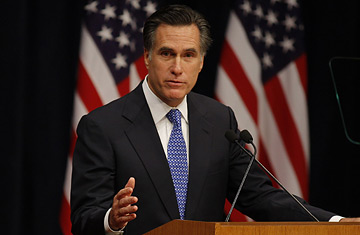
Republican presidential candidate Mitt Romney delivers an address titled "Faith in America" at the George Bush Presidential Library in College Station,Texas, December 6, 2007.
Speaking at the George Bush Presidential Library in College Station, Texas Thursday morning, former Massachusetts Governor Mitt Romney countered questions about his Mormon faith by throwing down an implicit question of his own to religious conservatives: Who are you more afraid of — Mormons or secularists?
The speech marked a shift in approach for Romney, who has previously sought to highlight areas of agreement between his faith and evangelical Christianity. Now he is attempting to take it one step further, drawing a circle around religious conservatives that includes evangelicals and Mormons, and defining them as in common cause against what he termed "the religion of secularism."
The Romney campaign's decision to try and reframe the religion debate in the Republican Party was shrewd. And the candidate left no buzzword untouched, name-checking nativities in public squares, strict constructionist judges, and the phrase "Under God." All are much ballyhooed causes of religious conservatives, especially during the December season when charges of a "War on Christmas" fill cable airwaves, and they build on the foundation set by the series of "Justice Sunday" events that the Family Research Council and others have put on over the past three years.
Still, Romney did little to put to rest persistent questions about what exactly he believes. The candidate promised at the beginning of his address that "I will offer perspectives on how my own faith would inform my Presidency," and asserted throughout that he was shaped by his religious beliefs, but he left the details vague. He mentioned the word "Mormon" only once, in a passage forcefully refusing to distance himself from his faith, and referred instead to "my faith" or "my church" on ten other occasions.
One charge critics level at members of the LDS Church is that the faith is too secretive. Romney pushed back against "some who would have a presidential candidate describe and explain his church's distinctive doctrines," arguing that "no candidate should become the spokesman for his faith." But that principled stance may simply stoke concerns that Romney is reticent because he is prohibited from disclosing details about his religious tradition. Romney did address one charge head-on, making clear that he would not be required to answer to church authorities in Salt Lake City. But that is not even the pervasive concern for him that it was for John Kennedy when he was required to declare in his landmark 1960 speech that the Pope would not influence his presidency.
Rumors about Mormonism continue to swirl on the ground in states like Iowa and South Carolina; earlier this year, an eight-page document titled "Mormons in Contemporary American Society: A Politically Dangerous Religion?" that referred to the founder of the Latter Day Saints as a "gold-digger" and compared him to the Muslim prophet Muhammed was mailed to conservative activists in South Carolina.
All in all, the speech was perfectly calibrated for a general election race — or for a Republican primary campaign that did not include a candidate by the name of Mike Huckabee. Romney has a strong case to make that the shared political and social concerns of religious conservatives across faith traditions require them to join forces in the public square. But that argument only holds so long as evangelical Republicans have no other candidates to choose from. The question isn't whether evangelical voters could support a Mormon, but whether they would back a Mormon over an equally appealing Catholic or Protestant. Like, say, Mike Huckabee.
